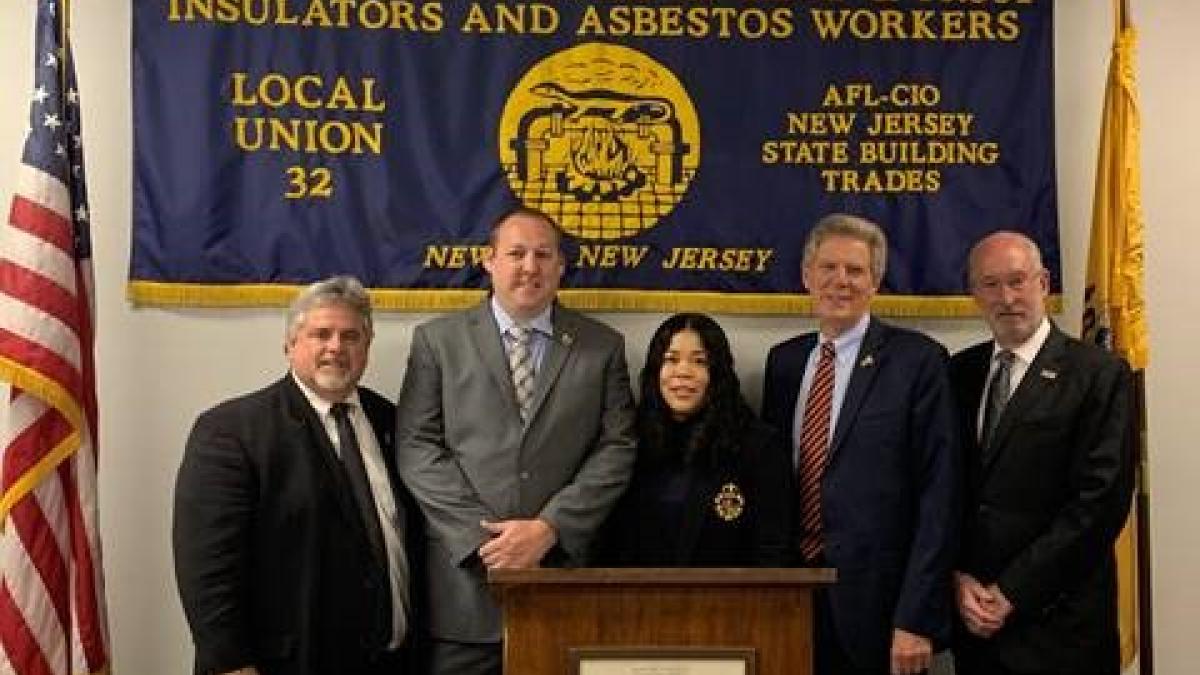Pallone and Local Leaders in Highland Park Call for Full Ban of Asbestos

Pallone Leading Legislation to Completely Ban Asbestos Now
Highland Park, N.J. – Congressman Frank Pallone, Jr. (NJ-06) held a press conference with local leaders to discuss the urgent need to pass legislation he introduced that would fully ban asbestos. He was joined by Dr. H. Richard Alexander, Chief Surgical Officer at the Rutgers Cancer Institute of New Jersey, C.J. Gesemyer from the Insulators Local 89, Tom Klukosky from United Auto Workers Region 9, Council Member Stephany Kim-Chohan from Highland Park, and Mike Schneider from Insulators Local 32.
The Alan Reinstein Ban Asbestos Now Act, H.R. 1603, would ban the production, use and importation of asbestos. Environmental Protection Agency (EPA) Administrator Andrew Wheeler committed to banning asbestos at a hearing with Pallone's Energy and Commerce Committee last month, but just one week later issued a new asbestos rule that fell far short of a ban. On Wednesday, May 8, the committee held a hearing on Pallone's legislation banning asbestos once and for all. H.R. 1603 is led by Representatives Suzanne Bonamici (OR-01), Elissa Slotkin (MI-08), and Pallone.
"It has been forty years since the EPA began to ban asbestos. Today, asbestos exposure still claims the lives of about 40,000 Americans every year. Enough is enough – it's time to fully ban this toxic and deadly substance and I believe the only way that will be possible is by passing this legislation," Congressman Pallone said. "I would like to thank Dr. Alexander who has worked tirelessly to counter the adverse health effects of this terrible substance. I would also like to thank C.J. Gesemyer, Tom Klukosky, and Mike Schneider, who joined us today to talk about the importance of protecting workers. Labor unions have been fighting for decades to protect workers from asbestos diseases, and I commend them for their hard work."
The EPA began the process of banning asbestos 40 years ago, but asbestos is still being imported and used in this country even though it has been banned in more than 60 other developed countries.
"It has been known for many years that the main risk factor for developing mesothelioma, a rare and complex cancer, is exposure to asbestos," said H. Richard Alexander, Jr., MD, Chief Surgical Officer at Rutgers Cancer Institute of New Jersey. "At Rutgers Cancer Institute of New Jersey, the state's only National Cancer Institute-designated Comprehensive Cancer Center, we provide the expertise and coordination of care necessary to tackle this disease and are working closely with colleagues around the country to develop better diagnostic and treatment options. Coupled with a reduction in environmental risk factors that contribute to the development of mesothelioma, there is an opportunity to improve patient outcomes."
Asbestos in all forms is known to be a leading cause of mesothelioma, lung cancer and other chronic respiratory diseases. According to a 2015 report, New Jersey has the eighth highest asbestos-related deaths. From 1999 to 2013, the same report estimated 128,000 to 160,000 people in the United States died from asbestos exposure, including 9,395 in New Jersey. Last year a new report found that those figures were low, and in fact nearly 40,000 Americans die from asbestos exposure every year.